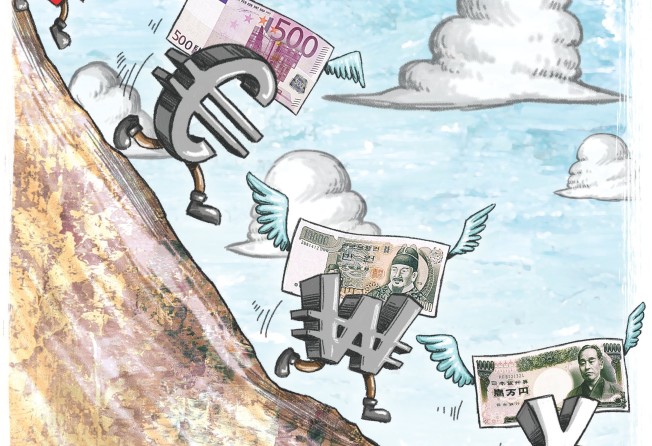
China's yuan effect: is this a currency war or a free-float push?
Some see export gains from the yuan's fall but others believe it could be part of a bigger drive to let the currency float freely

Beijing's moves over the past two days to weaken the yuan have raised speculation that China is embarking on a currency war to boost the country's exports and growth.
But many disagree, saying the move is part of the government's efforts to allow the yuan to float more freely on the international market.
China allowed the yuan to fall nearly 2 per cent against the US dollar on Tuesday and by a further 1.6 per cent on Wednesay.
Tuesday's fall was the sharpest daily devaluation since 1994 and followed weekend data that showed China's exports tumbled 8.3 per cent in July.
The world has long expected the yuan to eventually become a freely floating currency; the highly managed exchange rate is inconsistent with Beijing's other moves towards capital account liberalisation, internationalisation of the yuan, and to have the currency included in the International Monetary Fund's reserve currency basket.
Tuesday's announcement was a step in that direction, according to Hong Liang, chief economist with China International Capital Corporation.
"The move marks a significant step in the reform of the exchange rate system and paves the way for [the yuan] to join the currency basket of IMF's Special Drawing Rights," Liang said.
China's growing clout in the global economy means that moves to internationalise the yuan will inevitably have a tremendous impact on trade and global financial markets.
China is now the world's second-largest economy, the largest exporter of manufactured goods and the largest holder of foreign exchange reserves.
And that is why Tuesday's announcement stunned financial markets, sending stocks, currencies and commodities fall sharply across global markets.
China's central bank might have called it a "one-off depreciation" but investors were worried that it could all mean the start of a currency war.
"The [yuan's] volatility has already led to broad currency weakness in Asian currencies against the US dollar and heightened fears of a regional currency war," said Paul Mackel, head of Asian currency research at HSBC.
For years, many investments in yuan-denominated assets were built on the assumption that the yuan, as the lynchpin of Beijing's strategy to rebalance its economy away from exports and towards domestic consumption, would move higher.
Those bets have been rewarded as the currency has risen about 30 per cent in nominal terms against the US dollar in the past decade.
But Tuesday was an abrupt change in this course. Economists say central bankers and global investors are worried that the yuan, which has been a regional currency anchor, is succumbing to built-up market depreciation pressures.
They also note that the depreciation came after some policymakers in the region loosened financial conditions in response to weak domestic and external demand.
For example, South Korea, Thailand, Indonesia and Malaysia have sought to boost capital outflows among local investors, with low inflation rates likely giving most central banks room to allow a degree of currency underperformance.
Mackel said he expected more Asian central banks to explicitly allow currency underperformance, and warned that a "currency war" became communally destructive the moment it escalated to more than just a few countries.
Wang Tao, chief China economist with UBS Securities, said the yuan's depreciation could lead to further weakening of other emerging Asian currencies, which have already been pushed down by their weak growth and policy expectations from the US Federal Reserve.
But the yuan move was very modest and belated, Wang said.
Some economists say China could probably benefit from a weaker yuan as its economy is growing at the slowest pace in 25 years and rival exporters Japan and South Korea have weak currencies.
The yuan is near record highs in real effective terms - versus the currencies of trading partners and adjusted for inflation - having risen steadily since its fixed peg was loosened in July 2005.
However, others say Beijing's move is less about exports and more about further de-pegging the yuan from the greenback, a shift that would also have global implications.
"If de-pegged, the US dollar's role as a safe haven will slowly be eroded," said Hong Hao, chief economist and managing director of research at Bocom International. "This is the true significance of the central bank's decision."
Jianguang Shen, chief China economist with Mizuho Securities, agreed that the yuan's new fixing rate regime was not a depreciation move in search of export gains.
Shen said he expected the People's Bank of China to defend the yuan to prevent capital outflow.
"In view of both the domestic and international economic and financial conditions, there is no basis for persistent depreciation of the yuan," Shen said.
Wang said the central government was unlikely to let market momentum alone drive the yuan's exchange rate because of the destabilising impact.
She said Beijing might still want to take a relatively cautious approach on the exchange rate front, a view reflected by most analysts who maintain that a "currency war" can only lead to "currency suicide".
There are also wider strategic and geopolitical considerations in play.
A full-on depreciation would trigger an outcry in the US Congress as the presidential election season heats up and President Xi Jinping prepares to travel to the United States.